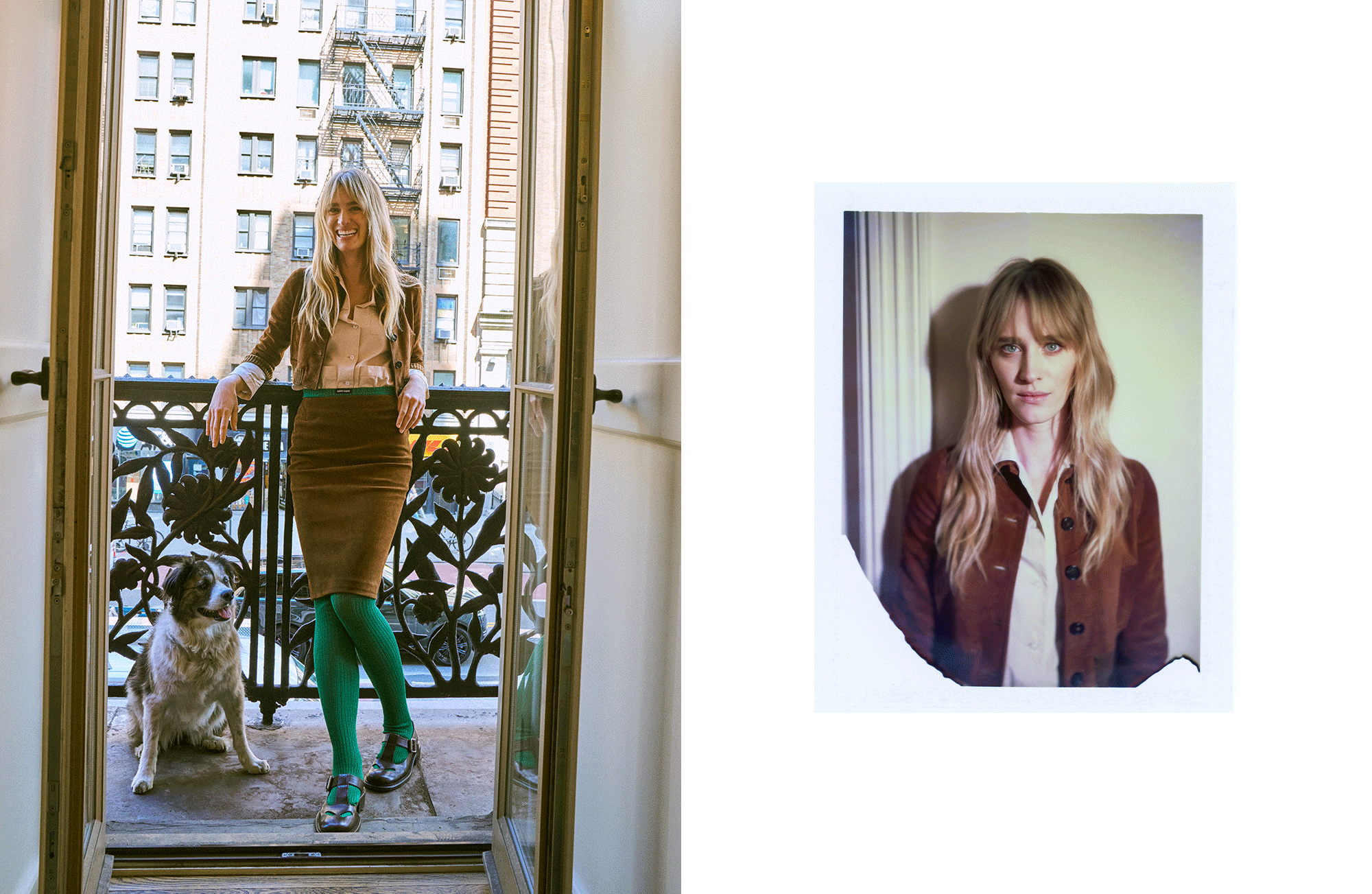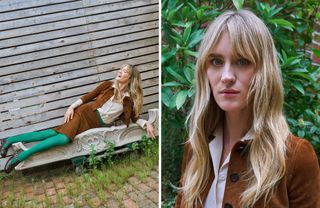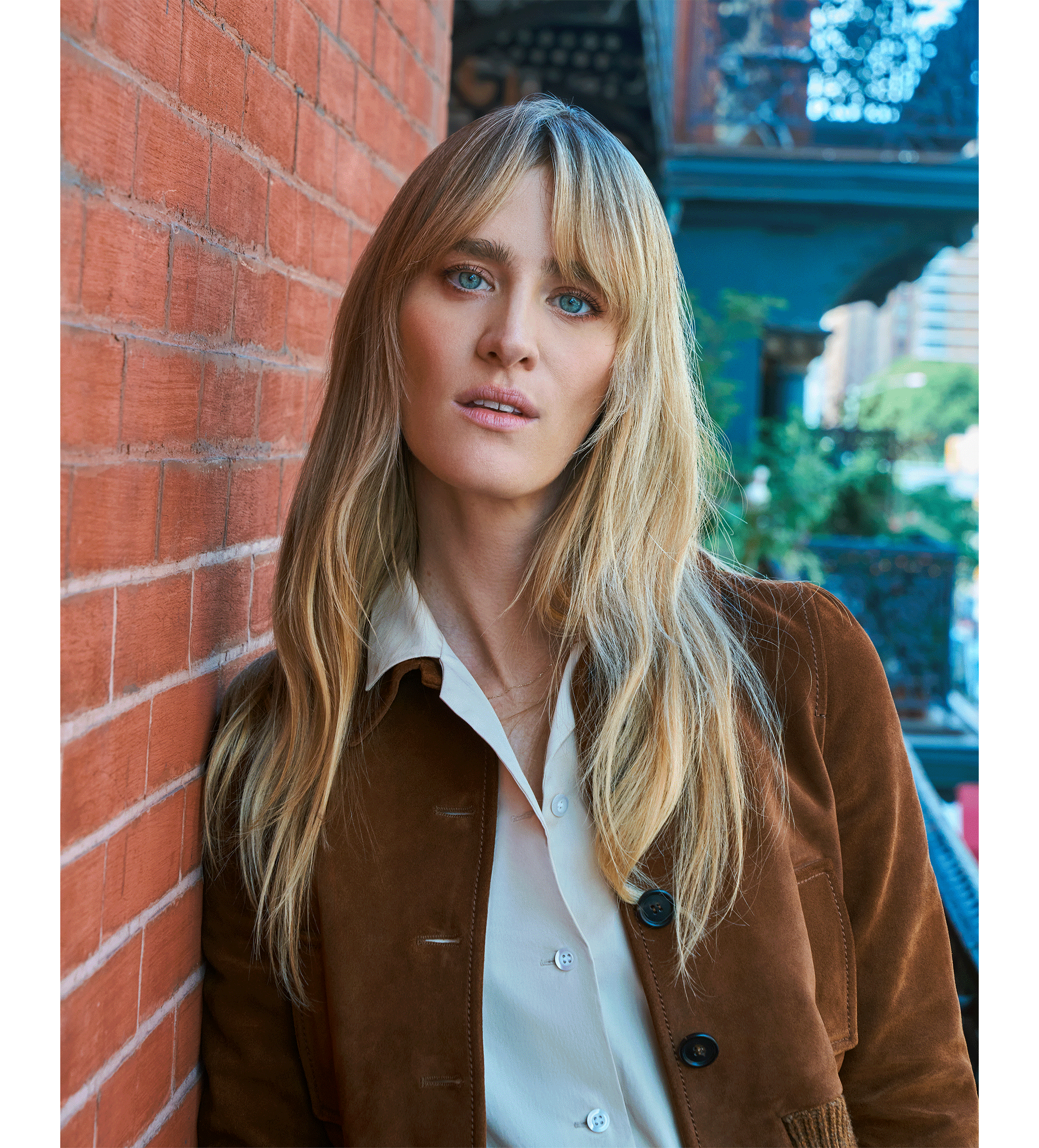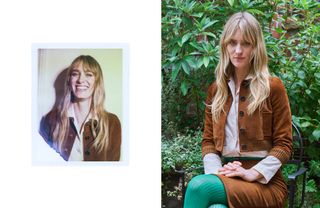Welcome to Portrait Session, an intimate photo and interview series featuring some of our favorite people of the moment.
The beauty of a film like Speak No Evil is that it is patient in its delivery of horrific events. Across its one hour and 50 minute run time, director James Watkins masterfully orchestrates a slow progression of increasingly eerie moments, like ticking up the steep hill of a roller coaster. The tension and anticipation gradually build for what’s to come before finally tipping you over that edge and releasing you, free-falling into a psychological nightmare. It is, by all accounts, a thrill ride.
Based on the award-winning screenplay of the 2022 Danish film of the same name, Speak No Evil follows the Daltons, an American family who befriends a charming British family while on vacation in Italy and accepts an invitation to spend the weekend at their idyllic country estate. As the cultural differences, social faux pas, and complicated interfamily dynamics stack up, what begins as a dream getaway soon descends into a hellish fight for their lives.
The film’s ability to make you cringe and even laugh with embarrassment one moment and feel an unsettled pang of distress the next hinges on its central performances that toe the line of good and evil. Estate owner Paddy (played cleverly by James McAvoy) is so charismatic it’s almost impossible for the Daltons to question his unconventional hospitality. While anxious mother Louise (a captivating Mackenzie Davis) is so concerned about offending others, she continues to mute her gut instincts, but at what cost? That push and pull creates a tautness that eventually has to burst in what is a cathartic final act.
For Davis—whose fantastic screenwork spans everything from prestige TV (Halt and Catch Fire, Station Eleven, and Black Mirror’s beloved “San Junipero” episode) to thrilling sci-fi blockbusters (Terminator: Dark Fate and Blade Runner 2049) and biting comedies (Tully and Irresistible)—Speak No Evil was an intriguing departure into the horror genre with a story with real-world stakes.
Hi! How are you?
I’m well. How are you?
I’m great, thank you. I love this shirt you are wearing.
Thanks. It’s a brand called Kotn. It’s a Canadian brand. My sister introduced me to it, and it’s great.
I appreciate you taking the time to chat with me about Speak No Evil. This movie is wild.
Did you think it was scary?
Not scary…
Neither did I!
It wasn’t like jump scary but definitely creepy. The stakes felt high, and you’re just in anticipation the whole time. I’m not great with horror movies. Whenever I go in for a screening, I get embarrassed because I’m covering my eyes most of the time.
I feel like that’s what being into horror is—that feeling of covering your eyes but still liking it. It’s like a drug.
That’s true, but I don’t seek it out. You won’t catch me going to Halloween Horror Nights or anything.
No, I understand that. Have you ever done that?
No. I think it would be too much for me. Have you?
Yeah, I have. I have done Halloween Horror Nights, which is really scary, but I also did Knott’s Scary Farm one year, and that was the scariest thing that has ever happened to me. I mean, thank god. They had people on Rollerblades that had metal knee pads, and out of nowhere, you would hear someone coming really fast and then skate on their knees, sparks flying everywhere while they scare the shit out of you. It really stuck with me.
No, thank you! Okay, what parts of the Speak No Evil really gripped you out of the gate? Why did this feel like the right role for you at that time?
God, how do you know? I didn’t know. I was just like, “This seems fun.” I thought the excruciating terror of making a misstep in a social situation with new people who don’t understand you and that being on the same plane as true mortal danger felt really relatable and true to my experience of humiliating myself or potentially offending someone. I think we are in an era … right now where there is an exposed nerve in society that we really don’t want to touch, and for good reason a lot of the time. We are really careful about potentially saying or doing something that incriminates us and deems us as a non-empath or as somebody who doesn’t do the work to understand other people’s experiences. But there are one million experiences that every person has, and to expect your interlocutor to always be aware of all of the ways in which you could be potentially offending or harming any number of things while you are talking to them is an unrealistic expectation.

There’s definitely a lot of “This doesn’t feel right, but I don’t want to offend them by saying anything” happening in this film. But at what cost?
Yeah, and you’re sort of muting or neutering your intuitive responses to things, which can be good because sometimes your intuitive responses are relayed in with unconscious biases or things that come with your upbringing that aren’t relevant or helpful to a situation. Regardless, you are constantly neutering what your most instinctual self is telling you about a situation, and I think it’s interesting to look at the potential downfall of that.
How familiar were you with the Danish film on which this one is based? Did you use that as a reference point at all?
I watched it after the fact. Our movie diverges quite a bit from the original in the latter third of the movie, but for the first two thirds, [it] is a pretty faithful adaptation. I don’t think that’s helpful to have that in my mind, but watching it afterward, it’s cool. It’s a cool litmus test for how different cultures will react to similar situations, and I think you can reinvent it again and again with couples from different cultures because their upbringing and their social norms are going to determine how they react to this situation, how polite they push it, how standing up and defending your land or your right. There’s something really distinct about the characters being American, and it’s different from the characters being Danish because the cultures are so different. I think that’s a fun experiment that you could reiterate with different cultures.

You can’t help but cringe watching a lot of the decisions the Daltons made. How was that for you in the beginning?
I understood that there is the trope in every horror movie of characters returning to situations of imminent danger in a really naïve or stupid way. We do that as well, but I really think the reasons they return are justified, and this social contract “not to be rude” is a really powerful tool or weapon that is yielded. There were parts that frustrated me, but I always understood. I just wanted to make sure that I could justify all of her behavior and build in the relationship between her and her husband and this tacit agreement that they seemed to have made in therapy for her to be a team player and that that was justifying a lot of her behavior. I think she knew what was wrong and what was right and how she wanted to react in situations but was, for the sake of her marriage, tamping those impulses down so she could be cool and easy and likable and not “bossy.”
Did you have any visual touch points for Louise?
I am not one of those actors, unfortunately. I wish I had a fun, mystical process, but no. Everyone has their individual logic that might not make sense to an outsider, but I just want to understand what her logic is, and on first read, I didn’t understand her logic sometimes. I was like, “Say something! Stop waiting for your husband!” It’s like, “Alright, well, I have to justify why she’s not saying something, and I have to understand why there are so many scenes where she’s looking for her husband to say something.” She’s obviously not a weak character based on how she develops throughout the film, so there’s something written in the subtext of this or some answer you need to give as to why she is being so different on the surface while having a pretty strong feeling in her eyes. It was just answering those questions for me and then seeing what part of the situation resonates in my own life.
I know what it feels like to get that idea in my head that I’m doing something right and then having one more degree of an understanding of a situation and being chilled by the realization that I’ve just been the perpetrator of something really awful. She feels that several times in defending her family and being faced with the experience of their hosts and how their upbringing influenced the way they’re interacting or how tragedy influenced the way they’re reacting to children being around. There is all this context that can keep getting layered infinitely on top of this social situation that can mean you are always in the right or always in the wrong, and you’re just trying to burrow a tunnel out of the darkness to be like, “What’s the right way to be now?” I related to that.

Louise is the one who has a lot of internal alarm bells going off during their stay. What about you? What would be the defining moment that you would be like, “Something’s not right here—we need to go”?
Well, there’s a moment in the middle of the night that happens in the movie where we decide to leave, and it is the exact time that I, too, would leave. I feel like it’s a very justifiable time to leave, and unfortunately, they are pulled back in. I don’t have kids. I don’t know what it’s like to have a kid love a stuffed animal so much that they kick the back of your seat and make you want to scream. That sounds horrible, but I don’t think I would be returning to that house. But the way it happened, I was like, “Yeah, I get why these people are going back.” She’s very upset. You would want that to stop.
This film plays with this extreme tension up until the final climax/release at the end. How was it playing with that throughout? How was playing that with James McAvoy, who so brilliantly walks that line of being charismatic and creepy?
It was really fun. James is really good at being charming and really good at being psycho, and he used both of those skills very well in this movie. We shot most of it in order, which is pretty rare. … By the time we got to the final act, it was such a necessary catharsis because it was like we had been edging for two months, and it was so uncomfortable to constantly be in this space of almost speaking or almost erupting. You were just like, “Alright, I’m going to have to kill someone. We’ve done this for too long.” It was really cathartic by the time it came up, but I like how many different types of tension there are in the movie. I always think about how families operate and how much subtext there is in a family.
If my sister and I were together, [an outsider] would see nothing, but I could ask her to pass me the tea, and if she didn’t pass me the tea, I would explode and start crying and being like, “This is exactly like what you did 10 years ago!” I would have such a huge emotional response that would seem unprovoked to an audience but is built on years of contracts and broken promises and ways under each other’s skin. That is so interesting, and I think you get that with the bunny that our kid has and us returning to the house in the middle of the night. There is something symbolic about that bunny, about prioritizing the child, about all of these tacit agreements that exist between husband and wife and the history of this family—like who is doing the most work, who would go back, who wouldn’t go back. There [are] all these decisions that are maybe inexplicable to an outsider but are built on so many barbs inside of them, where you’d rather put yourself in mortal danger than return to the same argument about the same shit.

Is this a warning sign for becoming friends with people you meet on vacation?
Generally, I think it’s good to leave a good situation where it is. Not everything has to extend into the rest of your life. Part of growing up is knowing that you can have a really nice time in a really special way with somebody or a few people in a specific time or place, but that doesn’t need to transfer into the rest of your life. Not all friendships and relationships work in the real world. Some should only live in fantasy, and that’s really valuable. It’s okay for things to just live in fantasy, in the vacation life. I would keep those walls up, ladies and gentlemen.

At this point in your life and career, when do you know a role is right for you at that time? What are you attracted to, and what do you want to do next?
I’d like to be genuinely surprised by something or somebody’s vision for something, and to think that they’re a sick freak is always a thrill for me because there’s not enough of them. It’s a weird job because it’s kind of like going from relationship to relationship, and you want your next relationship to give you all the things your last one didn’t. You are looking for things that are in conversation with the last job you did all the time.
I’ve never heard it compared in that way.
Hopefully, in real-world relationships, you settle into something that is whole and good for you, and you are not seeking the ideal thing. But in this job, you do get to bounce and react and be like, “I didn’t like that thing” or “I’ve done this thing too much—I want to do something that is completely different because that part of me hasn’t been exercised in a while.”
Speak No Evil is now in theaters.
Source link
https%3A%2F%2Fwww.whowhatwear.com%2Ffashion%2Fcelebrity%2Fmackenzie-davis-speak-no-evil
#Dispatch #Hotel #Chelsea #Mackenzie #Davis #Relatable #Terror #Speak #Evil



/cdn.vox-cdn.com/uploads/chorus_asset/file/25739519/wd_black_c50.jpg?w=520&resize=520,293&ssl=1)














